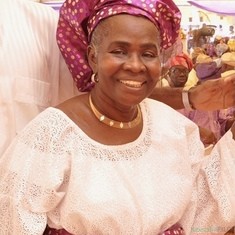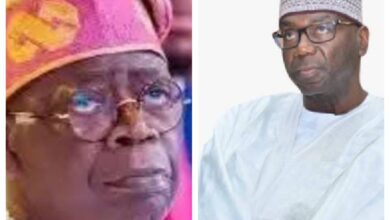MEM Kolawole: An African Womanist

By Muritala Awodun, PhD
We Lost an African Womanist, Great Mother, Lovely Wife, and Upright Mentor in Mary Ebunoluwa Modupeola Kolawole B.A. English, M.A. American Literature, PhD African Literature and Gender Theory Professor of African Literature and Gender Studies Concerning the demise of Professor Mary Ebunoluwa Modupeola Kolawole, we take solace in the words of God, found in Ecclesiastes, 3 verses 1 – 8 that says: “For everything there is a season, and a time for every matter under heaven: a time to be born and a time to die; a time to plant and a time to pluck out what is planted; a time to kill, and a time to heal; a time to break down and a time to build up; a time to weep and a time to laugh; a time to mourn and a time to dance; a time to cast away stones and a time to gather stones together; a time to embrace and a time to refrain from embracing; a time to seek and a time to lose; a time to keep and a time to cast away; a time to tear and a time to sew; a time to keep silence and a time to speak; a time to love and a time to hate; a time to war and a time for peace.”
Mary Ebun Modupe Kolawole retired early, as Professor of African Literature and Gender Studies from the Obafemi Awolowo University, Ile Ife in 2009 because her husband, Professor Deboye Kolawole, a Professor of Microbiology was due for retirement that year, and would be relocating to their home state, Kwara, from Ile Ife.
While at OAU, she was a Fellow of the Center for Gender and Social Policy Studies, Nigeria, Fellow of Network for Setting an Agenda for Women’s Studies in Nigeria, and Director, Centre for African Research in Progress. Professor Mary Kolawole joined the Kwara State University, Malete, upon her retirement from OAU, in 2009, to offer her State the required support in nurturing the newly established University.
At KWASU, she served as a Member of the Board of KWASU Centre for Entrepreneurship, Head of Department of Languages and Linguistics, Chairman of the University Ceremonies Committee, and Dean of the Postgraduate School, amongst other teaching, research, administrative and community development responsibilities. She left Kwara State University, in 2017, also because her husband was separating from the University, to take the deserved rest of retirement, having contributed her quota to lay the foundation to sustain the nascent University.
She received several distinguished international awards and honors, including the National Endowment for the Humanities/USIA, University of Berkeley, California, 1990, a Rockefeller Visiting Fellow in African Cultural and Gender Studies, Cornell University, Ithaca, NY, 1991/92, and Associate of the African Gender Institute, University of Cape Town, 1996. She was also a Guest Researcher at the Nordic Africa Institute, Uppsalla, Sweden, in 1997 and a DAAD Guest Scholar at Teh Humbold University, Berlin, 2002.
Professor Mary Kolawole was consultant to many international agencies including the Ford Foundation, the United Nations University, Tokyo, and the International Institute for Higher Education, NY. She was the Nigerian National Coordinator of the Women Writing Africa Project of the Feminist Press, NY. She won the USIA/National Endowment for Humanities, University of California Berkeley, 1990. She was the Rockefeller Fellow in African Cultural and Gender Studies at Africana Studies and Research Center, Cornell University, Ithaca, NY 1991/92. She was also a Commonwealth Fellow, at the University of Kent in Canterbury, 1994/95. She was also the Foundation Associate of the African Gender Institute, University of Cape Town, 1997, and Research Fellow, Nordic African Institute, Uppsala, Sweden, 1999. She was a participant at the International Scholars’ Program on “The 2000 African Internet Connectivity Project,” University of Michigan, East Lansing, Michigan, May, 2000.
Her book, Womanism and African Consciousness (Africa World Press, 1997) and others are on the reading lists of many American and European universities. Through an in-depth examination of the oral and written genres by and about women, Mary Kolawole presents a comprehensive account of the African woman’s role in forming and shaping cultural, societal and political spheres in that book, Womanism and African Consciousness. The book, in its 8th edition was first published in 1977 in English and held by 269 WorldCat member libraries worldwide, is a comprehensive study of the African woman’s cultural, societal, and political audibility. Through an in-depth historical critique of indigenous oral and written genres by and about women, the author challenges the accepted notion that African woman are “voiceless” members of society.
At the base for her study is the concept of “Womanism” – an ideology which she defines as the “totality of feminine self-expression, self-retrieval, and self-assertion in positive cultural ways.”
This methodology reveals hidden areas of audibility and calls for a new generation of writers who will create a global consciousness about the realities of the African woman and women of African descent. The issues discussed are important and relevant to current dialogue among critics of feminism. Her conclusions, particularly on the issue of the “invisibility” myth and its origins, are well supported.
Tracing the development of the portrayal of women in literature in a comprehensive and cohesive manner, the Mary Kolawole concluded that African women writers are not passive to their condition – they are not “voiceless.” She recommended a dialogic approach to modern criticism in order to accommodate all approaches to the African woman’s self-definition. A high level of consciousness, she asserts, is central to self-recovery for the African woman and can be attained through African womanist ideology.
Gender Perceptions and Development in Africa is another book of Mary Kolawole. In its 7th edition, it was published in 1998 in English and held by 81 WorldCat member libraries worldwide.
“In this multi-disciplinary collection of essays, several African researchers present gender perceptions that shape the lives of women. These studies critically present existing myths of gender in an attempt to transcend the stereotypes embodied in them. The collection further presents women’s life histories, socio-economic space, empowerment and environment to reveal the problems and the gains. Rejecting negative perceptions enhance African women’s search for social justice, poverty alleviation and reiterates women’s right as human right.”
The Context of African Women’s Struggle was published in 1997 in English and held by 1 WorldCat member library worldwide. Through an in-depth examination of the oral and written genres by and about women, Kolawole presents a comprehensive account of the African woman’s role in forming and shaping cultural, societal and political spheres.
Zulu Sofola: Her Life & Her Works is another Mary Kolawole’s book that is in its 6th edition and was published in 1999 in English and held by 84 WorldCat member libraries worldwide.
Some of her other most widely read works are:
– Perspectives on African Studies: A Multidisciplinary Approach
– Gender Theories and Polemics: A Critical Source Book: Festschrift in Honour of Professor Mrs Mary Ebun Kolawole
– An African View of Transatlantic Slavery and the Role of Oral Testimony in Creating a New Legacy
– Re-conceptualizing African Gender Theory: Feminism, Womanism and the Arere Metaphor
– The Context of African Women’s Struggle
– Text, Texuality and Contextuality: Paradigms Lost and Paradigms Regained in Literary Theory
– The African Write as a Maker and a Mask
She was the Editor-in-Chief of the following Journals:
– Journal of Gender and Development in Africa, Center for Gender and Social Policy Studies, Obafemi Awolowo University, Ile-Ife, Nigeria.
– ISALA: Ife Studies in African Literature and the Arts, Department of English, Obafemi Awolowo University, Ile-Ife, Nigeria.
A devout Christian, lover of family, mentor and marriage counselor, Professor Mary Ebun Modupe Kolawole died in Ilorin, Kwara State in the early hours of Tuesday, February 16, 2021 leaving behind her husband and two children.
“Mummy Mary Ebunoluwa Modupeola Kolawole, when our path crossed in 2009 at the Kwara State University, Malete, in the College of Humanities, Management and Social Sciences, you found a new son in me, and I found a new mother in you. You sowed in me your trust and believe, and you reaped in me multiple trust and support; you laughed with me and danced with me; you sorrow with me and wept with me; you counseled me and prayed with me; you encouraged me and gave me hope; you opened your arms to cuddle me and bent your back to carry me, you embraced me and lifted me; you opened the doors of your home to me and my family members; you guided me with your knowledge and experience; you believed my dreams and refined my visions; you scolded me and blessed me; you defended me and shielded me; you praised me and promoted me; my friends you accepted as your friends, and my enemies became your enemies; you wined with me and dined with me. On Tuesday, January 12, 2021 when I heard of your ailment and came to the house to know how you were responding, while discussing with your husband downstairs, because I did not want to disturb your rest, you came all the way down from your bedroom to see me, despite your ill-health, which became your farewell to me, and I still can see the smiling face and joy expressed at seeing me. Exactly four weeks after, on Tuesday, February 16, 2021 you gave up the ghost to rest in the bosom of the Lord your creator, in peace, and yet I lost another mother, fourteen years after losing my biological mother, and twelve years after finding you as a replacement.”
Mummy, may your gentle soul find peace, and find rest in that perfect peace, Amen.
Awodun, PhD, is a Professor of Business Administration, Centre for Enterprise and Human Capital Development, Crown-Hill University, Eiyenkorin, Ilorin, Kwara State, Nigeria





